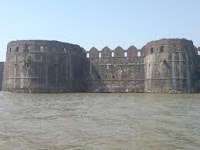The word Janjira is not native to India, and may have originated after the Arabic word Jazeera, which means an island. Murud was once known in Marathi as Habsan, or Abyssinian's land. Some of the people also split the name as "JAL JEERA" meaning fort in the water.
The name of the fort is a concatenation of the Konkani and Arabic words for Island, "morod" and "jazeera".The word "morod" is peculiar to Konkani and is absent in Marathi.Thus, during the rains, the fields get flooded,but the morods never flood.The State of Murud-Janjira was known to the Maratha Empire as Habsan,the land of the Habshis.
 It is really good to see this fort. the coventers of this fort is really different from other forts.Sambhaji Maharaj (Son of Chatrapati Shivaji Maharaj)constructed a fort on a nearby island (Padmadurg Fort, now known as Kasa). Kasa is not accessible to the public and requires special permission from the Navy.
It is really good to see this fort. the coventers of this fort is really different from other forts.Sambhaji Maharaj (Son of Chatrapati Shivaji Maharaj)constructed a fort on a nearby island (Padmadurg Fort, now known as Kasa). Kasa is not accessible to the public and requires special permission from the Navy.Murud doesn't just have a Beach & the fort. It also has a Temple over the hill next to the New Bus Depot (known as Datta cha Dongar) Hill of Lord Dattatray. One can have a paranormic view of Murud both the islands together from the hill.

 Further ahead of the hill is an idga, the walk though the dense jungle is a experience in itself. The fort also boasts of a sweet water lake inside it. It is considered to be a miracle that the Fort surrounded by the salty water of the sea has a lake full of sweet water. Also the cannons in the fort are quite unique. The biggest cannon boasts a range of around 18 km. It is said that since the entire cannon could not have been transported at once they had to be brought in pieces and they were then assembled inside the fort.
Further ahead of the hill is an idga, the walk though the dense jungle is a experience in itself. The fort also boasts of a sweet water lake inside it. It is considered to be a miracle that the Fort surrounded by the salty water of the sea has a lake full of sweet water. Also the cannons in the fort are quite unique. The biggest cannon boasts a range of around 18 km. It is said that since the entire cannon could not have been transported at once they had to be brought in pieces and they were then assembled inside the fort.When the rulers of the fort gave up their rule they settled in a near by village and named it Rajpuri (meaning end of the Rule, Raj = Rule and Puri = End)
![]()
If you like this please Link Back to this article...

















0 comments:
Post a Comment
Note: Only a member of this blog may post a comment.